Baby Please Don't Go
Nobody plays Baby Please Don't Go the way we do. But then, folks have been remaking this one for a long, long time. It's our turn.
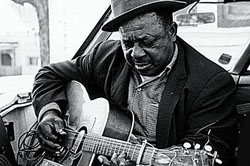 |
The long road of invention and adaptation—we know it as the "folk process"—for this particular song can be traced back at least to the dawn of the 20th century. Max Haymes offers a longish guided tour of the sights and sounds along the way at earlyblues.com if you think you'd enjoy the exercise. But if you're looking for a short cut, Wikipedia's entry will get you home quick:
"Baby, Please Don't Go" is a blues song first recorded by Big Joe Williams in 1935. It is related to a group of early 20th century blues and work songs that include "I'm Alabama Bound", "Another Man Done Gone", "Don't Leave Me Here", and "Turn Your Lamp Down Low".
According to Barry Lee Pearson's thumbnail bio of the artist at AllMusic.com Big Joe "may have been the most cantankerous human being who ever walked the earth with guitar in hand. At the same time, he was an incredible blues musician: a gifted songwriter, a powerhouse vocalist, and an exceptionally idiosyncratic guitarist."
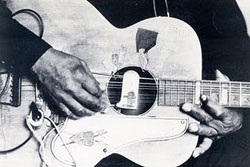 |
What constitutes "idiosycratic", you ask? Well how about playing a 9 stringed guitar, for starters. It was usually tuned to open G, with the 1st, 2nd and 4th strings doubled: D-G-DD-G-BB-DD. Still not idiosycratic enough for you? Picture this, if you will:
When appearing at Mike Bloomfield's "blues night" at The Fickle Pickle, Williams played an electric nine-string guitar through a small ramshackle amp with a pie plate nailed to it and a beer can dangling against that. When he played, everything rattled but Big Joe himself. The total effect of this incredible apparatus produced the most buzzing, sizzling, African-sounding music one would likely ever hear.
Big Joe Williams recorded the song several times and performed it throughout a career that spanned 5 decades. You might find it interesting to compare these two audio clips from very early in his (and so, the song's) career. The first is his 1935 debut of the tune, performed with violin and washboard, a setting that harkens back to his early-early years playing in minstrel shows and jug bands. That is followed by what many regard as the definitive version of the song, recorded in 1941 with Sonny Boy Williamson on harp.
Audio Clip: Big Joe Williams' debut recording of Baby Please Don't Go, 1935
Audio Clip: Big Joe Williams with Sonny Boy Williamson, 1941
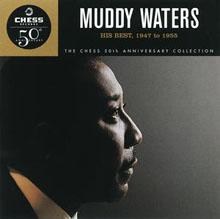 |
Later in the 1940's the blues itself was to get citified as musicians started taking advantage of all that electricity buzzing through the walls. No town was more hospitable to that movement than Chicago and no musician more central to it than Muddy Waters. He could do straight country blues with the best of them, but by 1953 he'd unhitched his mule and was putting electrons to work creating what came to be known as Chicago blues. Also put to work on this cut is another great harmonica player, "Little Walter" Jacobs. Countless blues bands have recorded Baby Please since, but you'll be forgiven if you're satisfied with this.
Audio Clip: Muddy Waters plays Baby Please Don't Go, 1953
British rockers, you know, had a thing for American Blues in the 60's. A number of them did their homework, then turned around and took us to school on the subject. The group Them was not, strictly speaking, British at all, but they were marketed as part of the British Invasion. So, close enough for Yanks. Formed in Belfast in 1964 and fronted by a young Van Morrison, the group went through a number of incarnations. If you wanted to be clever—as I do—you might call that early period the group's "Gloria days".
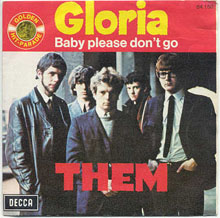 |
Audio Clip: For those whose grasp of Rock history is as weak as mine, Gloria, by Them, 1964
That song was the B side to Them's release of Baby Please Don't Go. Both tracks did quite well for the lads. Gloria has been a garage band staple ever since, and Baby Please became the group's first hit record, reaching #10 on the UK charts. One listen to the following audio clip will make clear why: an inventive arrangement, well-crafted and well-executed. Hit it boys!
Audio Clip: Them's recording of Baby Please Don't Go, 1964
We note, in passing, that the song has since been covered by many a Rock musician as well: The Doors, Al Kooper, Aerosmith, Tom Petty and the Heartbreakers, The Animals. The list goes on and on. If you don't like this song, you're the only one.
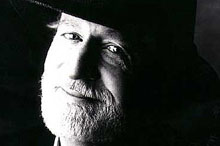 |
But even if we had a less democratic attitude regarding such important matters and left the final "yay" or "nay" vote on a song's keepability to our betters, I would be swayed to the point of tipping full-bodied into the "yay" camp by Mose Allison's thumbs-up. And not only because his is the first version of the song I ever heard. No. Because the man's music cheers me just about any time I hear him sing and play, and I appreciate that.
How could you not love the man who penned the line, "Your mind is on vacation but your mouth is working overtime"? How can you not hand it, all of it, to a guy who at age 80ish reworks the folk classic This Train ("This train don't carry no gamblers, this train...") as My Brain ("My brain, it's always tickin', my brain...")? If he digs a song, it's vetted. And he digs this tune. I've heard recordings of him performing it as early as 1961 and for all I know he was playing it as a teenager in the 1940's. That would have been in the Mississippi Delta, where both he and Big Joe Williams were born and raised, upriver from New Orleans. See if you can't hear that proud city's influence on this arrangement.
Audio Clip: Mose Allison in live performance playing Baby Please Don't Go
All Community Guitar Resources text & material © 2006 Andrew Lawrence
